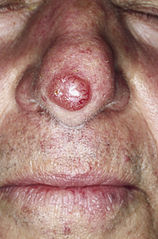06 Oct Can NSAIDs Prevent Some Basal Cell Skin Cancers?
 MedicalResearch.com Interview with:
MedicalResearch.com Interview with:
Nirmala Pandeya, PhD
Post Doctoral Research Fellow
Faculty of Medicine and Biomedical Sciences, School of Public Health
Herston campus The University of Queensland
Medical Research: What is the background for this study?
Dr. Pandeya: Basal cell carcinoma (BCC) is the most common cancer. Although BCC is curable and has low mortality, its high occurrence in the population causes significant healthcare and financial burdens to the community. Hence exploring preventive strategies for this cancer is important in reducing the burden. To date few chemopreventives for BCC have been identified.
In many cancer cells, inflammatory biomarkers such as cyclooxygenase-2 (COX-2) and its product prostaglandin E2 are increased and basal cell carcinoma is no exception. Anti-inflammatory drugs, suppressing COX-2 activity, have been shown to reduce the risk of various cancers including squamous cell carcinoma of the skin, so they also have a potential to prevent BCC. But to date research evidence on the benefit of aspirin and other nonsteroidal anti-inflammatory drugs (NSAIDs) on basal cell carcinoma has been inconsistent. So we reviewed and synthesized all published epidemiological studies on NSAIDs and BCC to combine results and estimate the overall pooled effect.
Medical Research: What are the main findings?
Dr. Pandeya: After thorough evaluation, we identified eleven studies that were relevant and pooling showed a 10% reduction in risk of BCC among those using any kind of NSAIDs. Aspirin and non-aspirin NSAIDs analysed separately suggested a reduced risk of basal cell carcinoma, but were not statistically significant likely due to lack of power. Our research found strongest risk reduction of BCC by the use of NSAIDs among those with either a history of skin cancers or high prevalence of actinic keratosis.
Medical Research: What should clinicians and patients take away from your report?
Dr. Pandeya: We believe NSAIDs could potentially prevent some basal cell carcinoma and that clinicians can consider this when prescribing NSAIDs, particularly for patients who are at high risk of skin cancers. We were unable to assess the effect of different dosage and duration of NSAIDs use because of the inconsistent pattern of reporting in the literature. Similarly, we could not assess whether the benefit of NSAIDs outweighs their adverse effects. Thus so far reducing sun exposure is the only effective prevention.
Medical Research: What recommendations do you have for future research as a result of this study?
Dr. Pandeya: We do not recommend that clinicians prescribe NSAIDs for skin cancer prevention since there are still many unanswered questions in this relation. Statistical adjustment of potential confounders particularly UV exposure are important to confirm the independent effect of NSAIDs on basal cell carcinoma. Future researchers need to assess and report the dose and the duration of use in a consistent manner so results can be synthesized in an effective way. Most importantly, a large randomised controlled trial will be needed to answer further if NSAIDs is useful as a preventive measure for BCC.
Citation:
Nirmala Pandeya, PhD ( Muranushi, Chiho et al.
Journal of the American Academy of Dermatology 2015).
DOI: http://dx.doi.org/10.1016/j.jaad.2015.08.034
MedicalResearch.com is not a forum for the exchange of personal medical information, advice or the promotion of self-destructive behavior (e.g., eating disorders, suicide). While you may freely discuss your troubles, you should not look to the Website for information or advice on such topics. Instead, we recommend that you talk in person with a trusted medical professional.
The information on MedicalResearch.com is provided for educational purposes only, and is in no way intended to diagnose, cure, or treat any medical or other condition. Always seek the advice of your physician or other qualified health and ask your doctor any questions you may have regarding a medical condition. In addition to all other limitations and disclaimers in this agreement, service provider and its third party providers disclaim any liability or loss in connection with the content provided on this website.
Last Updated on October 7, 2015 by Marie Benz MD FAAD
